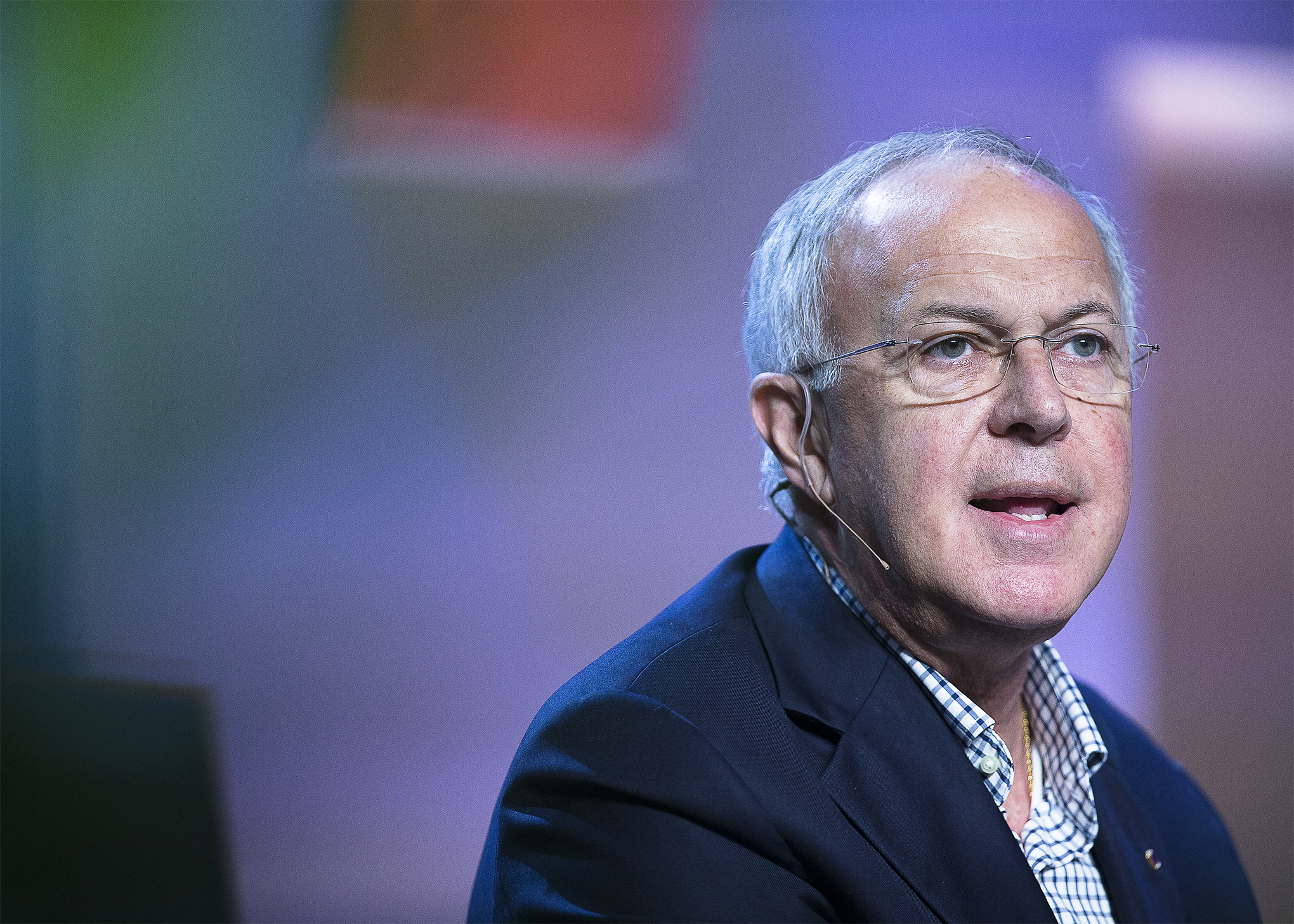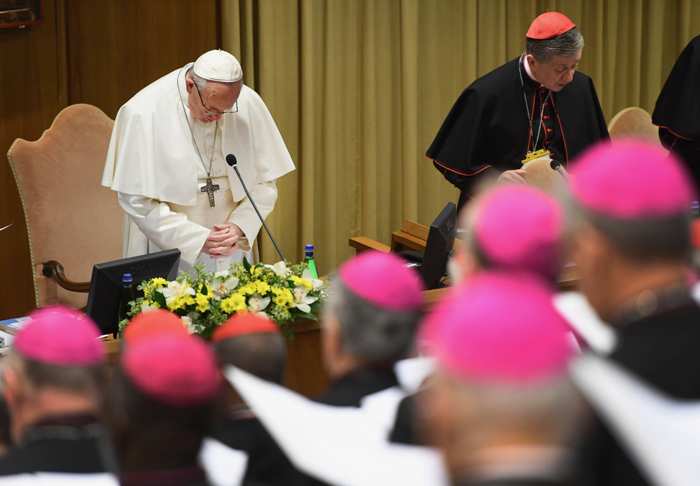Bishops attending the Vatican’s abuse summit were today presented with a step-by-step plan for holding them accountable for sexual misconduct or cover-up claims.
During a hard-hitting speech in the Paul VI synod hall on Friday 22 February, the Archbishop of Chicago, Cardinal Blase Cupich, told 190 church leaders and religious superiors to adopt a “culture of accountability” that includes “proper structures to radically alter our approach to child safeguarding”.
Day two of Pope Francis’ child protection gathering saw speakers draw on the teaching of the Second Vatican Council to provide the theological resources for a global Church response to the abuse crisis. They argued that collegiality means bishops have a collective responsibility for child protection and that synodality requires the involvement of laity in the investigations to hold bishops accountable.
Cardinal Cupich, who is one of the organisers of the anti-abuse summit, said the Church must reject a clerical culture which preferences a strategy based on hiding behind lawyers and following “status and immunities” for priest offenders, and adopt the stance of a “grieving mother” which offers a “Christ-like accompaniment” to victims.
But this, he stressed, requires action.
During his speech, the cardinal offered a detailed framework for investigating allegations against bishops who are either negligent in their handling of abuse or have been accused of misconduct. It is the first time in the history of the clerical sexual scandals of recent decades that bishops from across the world have discussed episcopal accountability over abuse.
The cardinal set out three steps for investigating allegations, which he said must involves lay experts throughout.
“It makes it Church, where we are all in this together,” he explained in a briefing with journalists after delivering his talk.
Critical to the Cupich plan is the Metropolitan Archbishop, who on paper has some oversight over local bishops in any given region. According to the current organisational structure of Catholicism, local bishops are autonomous in their diocese, although church tradition allows metropolitans to have some jurisdiction. It is this that the cardinal is using to build his accountability plan.
The first step, he explained, requires local churches to “establish standards” for conducting investigations into abuse. Second, independent mechanisms should be established to report allegations to either the apostolic nuncio (papal ambassador) or Metropolitan Archbishop, who has responsibility for a local region. He recommended establishing a web portal service or dedicated telephone line for reporting.
Third, the cardinal says that a metropolitan should promptly investigate allegations and recommend any disciplinary measures to the Holy See. The Pope retains the final say, and the Vatican is able to take the case into their own hands. When a metropolitan is accused, he explained, another archbishop or senior prelate would be called to investigate.
The cardinal points out that lay Catholics should help gather information in an investigation, but says the judgments on a bishop rest with the Holy See and the metropolitan. Last year, hastily draft proposals in the United States Church had been put forward for lay boards or commissions to judge bishops, but these were ruled incompatible with Church law by the Holy See and had not been discussed with Rome.
Cardinal Cupich’s emphasis was on laying out the procedures for investigating bishops, which he said builds on the Pope’s 2016 accountability legal ruling “Come una madre amorevole” (“As a loving mother”), a document that provides for the removal of a negligent bishop. This ruling, which senior church figures say needs to be better implemented and understood, gives wide scope for ensuring episcopal accountability.
During a briefing for journalists the Archbishop of Boston, Cardinal Sean O’Malley, who is President of the Pontifical Commission for the Protection of Minors, says he is expecting the Vatican to issue a clarification on the implementation of the 2016 ruling.
The cardinal, a longtime fixer of clerical abuse scandals, said that when failures of leadership are exposed in one part of the Church, it affected everywhere else, including those parts that have made necessary changes.
In a similar vein, the Archbishop of Mumbai, Cardinal Oswald Gracias, told bishops they must return to the teaching of Vatican II on collegiality, particularly “Lumen Gentium,” which sets out the dogmatic constitution of the Church.
The cardinal explained that a bishop is not just in charge of his diocese, but by virtue of his position has wider ecclesial responsibility.
“No bishop may say to himself, ‘this problem of abuse in the Church does not concern me, because things are different in my part of the world.’ We are each responsible for the whole Church,” he said.
The second day of the summit saw the first woman address the gathering. Dr Linda Ghisoni, a Canon Lawyer and official at the family life department in the Vatican, stressed that Vatican II’s vision of the Church sees it as a communion; where a bishop must not make decisions on his own or by simply consulting his peers, and where the “People of God” are involved in facing the abuse scandals.
She pointed out, however, that the involvement of laity does not guarantee “greater correctness,” and dismissed the idea that a “commission of laymen” is more credible than a “commission of priests.”
Dr Ghisoni argued for reforming legislation over “Pontifical Secrecy,” a code of confidentiality which places a strict burden of secrecy on certain pieces of information. While this is in place to protect reputations and “the good of the Church”, it needs to be developed to allow for greater transparency and avoid the idea that “the secret is there to hide problems”.
It also emerged today, that an internal Vatican inquiry into how ex-cardinal and former priest Theodore McCarrick managed to rise up the ranks of the Church despite allegations of sexual misconduct will soon reach a conclusion.
Cardinal O’Malley said he is hoping there will soon be a declaration about the investigation and that dioceses in the United States have provided info to the Holy See for the inquiry. Last Saturday the Vatican announced McCarrick – who in 2002 took a lead role in US bishops’ response to abuse – had been removed from the priesthood for sexual sins and abuses of power against minors and adults.
Speaking at a briefing on Friday 22 February, Cardinal Cupich described the McCarrick matter as “sad” and that it underscored the need for accountability. And in his speech, he recognised the disconnect between bishops and people that the abuse crisis had revealed.
“Many of our people, not just those abused or parents of the abused, but the faithful at large are wondering if we the leaders of the Church fully understand this reality, particularly when they see little care given to abused children, or even worse, when it is covered up to protect the abuser or the institution,” he said.
“They are asking themselves, ‘If church leaders could act with so little care in giving pastoral attention in such obvious cases of a child being sexually molested, does that not reveal how detached they are from us as parents who treasure our children as the light of our lives?’”



 Loading ...
Loading ...